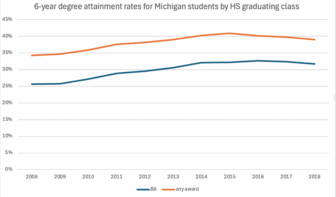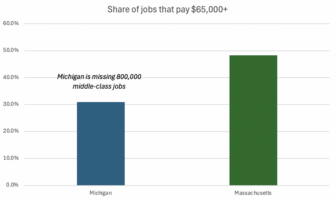A recent Detroit Free Press article entitled GM’s job cuts shift to a new kind of worker needed is worth checking out. It is a pretty dramatic example of the reality ![]() that––even for those with STEM degrees (in this case engineers)––the foundation skills for all are what we call rock climbing skills, not job-specific skills.
that––even for those with STEM degrees (in this case engineers)––the foundation skills for all are what we call rock climbing skills, not job-specific skills.
The article describes the bottom line this way: General Motors is a technology company that makes cars and the skills its employees had yesterday are continuously becoming outdated.
The article continues with quotes from Marick Masters, professor of business at Wayne State University:
“Technology has changed so fast and is changing so fast that if you’ve been out of school 10 or 20 years, you’re not at the leading edge anymore,” said Masters. … “I don’t know if they’re extinct or need a new degree, but they need to be engaged in continued learning and advancement,” said Masters. “They need to be agile. Organizations do not guarantee lifetime employment anymore. This is a statement that the world is changing.”
The “new” GM will want workers who are highly creative and capable of working autonomously as well as collaboratively, Masters said. The future employee will take initiative and have a strong technology background, good communication skills and project-management capability. GM might do more contract hiring to keep fixed costs low and GM’s agility high, he said.
Research by David Deming and Kadeem Noray demonstrates that what veteran GM engineers are experiencing is common for those with STEM degree. They write:
This paper presents new evidence on the life-cycle returns to STEM education. We show that the economic payoff to majoring in applied STEM fields such as engineering and computer science is initially very high, but declines by more than 50 percent in the first decade after college. STEM majors have flatter age-earnings profiles than college graduates who major in other subjects, even after controlling for cognitive ability and other important determinants of earnings.
The need, first and foremost, to be able to constantly adjust to the changing nature of work in order to have a good-paying forty-year career is not limited to GM engineers or more broadly those with a degree in a STEM field. The reality is none of us have a clue what the jobs and occupations of the future will be. Today’s jobs are not a good indicator of what jobs will be available when today’s K-12 students finish their careers in the 2050s or 2060s. We simply don’t know how smarter and smarter machines are going to change labor markets.
Who knows when autonomous vehicles will replace truck drivers; software, not healthcare professionals, will do diagnostics; software, not financial advisors, will provide us with investment advice; machines will move materials in warehouses; on and on and on. But it is a matter of when, not if, much work now done by humans will be done by smarter and smarter machines.
Its not that work will disappear but that most of us are going to have to be able to adapt and learn new skills to be able to have successful forty-year careers. That requires a transformation in our system of lifelong learning and how we support people as they transition from one occupation to the next and more and more of us are contingent workers. So the purpose of pre K-12 education (maybe even pre K-16) is to build foundation skills that allow all Michigan children to have the agility and ability to constantly switch occupations – to be successful rock climbers.
The best definition we have found for this complex set of skills comes from the book Becoming Brilliant, by learning scientists Roberta Michnick Golinkoff and Kathy Hirsh-Pasek, who label these skills the six Cs:
- Collaboration, the ability to work and play well with others, which encompasses a wide range of soft skills necessary for success in the modern workplace;
- Communication, the ability to effectively get your point across and back it up with evidence, both verbally and in writing, and the ability to listen and be empathetic;
- Content, deep understanding and a broad base of knowledge in a range of subject areas, rather than simply surface knowledge of reading and math skills;
- Critical Thinking, the ability to sift through mountains of information and get a sense of what’s valuable and not and to solve unanticipated and unpredictable problems;
- Creativity, the ability to put information together in new ways;
- Confidence, which encompasses capacities like grit, perseverance, and a willingness to take risks.
These are the foundation skills that all of us need, no matter what first job/occupation we decide to pursue after we finish our education.







